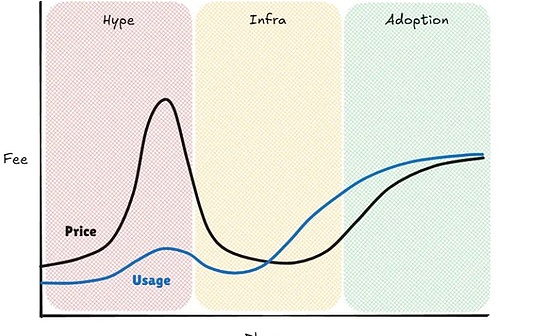
Source: Galaxy; Compiled by: Bitchain Vision
October 17,Dankrad Feist, Senior Ethereum Researcherannounced that he will be joining Tempo, a payment-focused Layer-1 chain developed by Paradigm.Dankrad has been working full-time at the Ethereum Foundation since 2019 (in cryptocurrency, six years seems like a lifetime.) This spring, he played a major role in Ethereum’s scalability debate and contributed to PeerDAS (EIP-7594), a key component of Ethereum’s plan to achieve scalability through Layer-2.
Feist’s exit sparked a new round of reflection and criticism of EF and its leadership, venture capital (VC) investors in the Ethereum ecosystem, and the Ethereum community as a whole.Focusing on these key points, there are three core communicators fromPéter Szilágyi (former head of Geth client),Sandeep Nailwal (Founder and CEO of Polygon Foundation)and Joseph Lubin (co-founder of Ethereum and founder of Consensys).
Szilágyi’s remarks are particularly significant because he released a private letter he sent to the Ethereum Foundation’s leadership in May 2024.The letter was scathing, with scathing accusations against the Ethereum Foundation’s leadership, its treatment of employees, and the “cabal” steering Ethereum’s direction.Szilágyi began by detailing the vast pay gap between Ethereum Foundation contributors and what he calls the ecosystem’s “high rollers.”He revealed that during his first six years working full-time on Geth, Ethereum’s most commonly used execution client, he earned a total pre-tax income of $625,000 without any incentives, even as Ethereum’s market cap grew from zero to $450 billion.He thinks,The foundation has long underpaid its most committed contributors, creating perverse incentives that force technically gifted but underpaid developers to seek outside consulting or advisory positions for the sake of financial stability.In his words, “Foundations set the protocol up to be self-trapped by necessitating financial dependence on outside parties.”He also criticized the foundation’s internal culture, arguing there was a huge discrepancy between its public image and its private reality.Foundation officials portray him as a respected leader and spokesperson for client diversity efforts.Privately, he claimed, he was viewed as a nuisance and his influence was only tolerated when it was convenient.He claimed that Feist had privately described Szilágyi’s position as merely “a recognized leadership role,” a description the developer found fitting: praised in public but shunned in private.He described himself as a “useful fool” who was used to demonstrate the foundation’s openness to internal dissent, while privately he was increasingly marginalized.He said every time he spoke out against “power players” his credibility was damaged and every act of conscience turned into reputational damage.
Beyond compensation and governance, Szilágyi claims that Ethereum has quietly developed an entrenched social hierarchy.He claimed,Success in the ecosystem depends less on individual ability and more on proximity to a small network of about “five to ten well-known researchers and investors” and “one to three venture funds” that support them.Szilágyi said members of this group, who are often close to Ethereum founder Vitalik Buterin personally, effectively act as gatekeepers in deciding which projects gain legitimacy, visibility or funding.He thinks,“Although Ethereum is decentralized, Vitalik definitely has complete indirect control over it”, as his endorsement (direct or indirect) still determines which projects thrive.In Szilágyi’s view, the Ethereum culture that once prided itself on permissionless innovation has now been reduced to a “ruling elite” of friends, researchers, and investors, and their alliance with Vitalik determines the success of the project.
Taking all of this into account, Szilágyi warns,The foundation’s structural flaws have turned Ethereum into fertile ground for protocol capture.He said the organization effectively cedes influence to outside financial players by depriving internal talent of meaningful compensation while tolerating advisory entanglements between Ethereum Foundation researchers and venture capital projects.What started as an idealistic open source movement has become, in his words, a place where “we set out to build something great, but once (enough) money is available, we throw away all principles without hesitation.”To him, this dynamic represents Ethereum’s moral decline, with its original mission of open participation and decentralization being replaced by financial and political incentives manipulated by a handful of insiders.Szilágyi concluded: “So, where does this all lead us? I really don’t know. Can Ethereum be fixed? No, really not.”
Polygon’s Nailwal shared Szilágyi’s frustration, saying that reading the letter made him “question his loyalty to Ethereum.”He expressed deep respect for Vitalik, but also lamented the years of neglect by the Ethereum Foundation and the hostility of some community members who “campaign maliciously against projects like Polygon” despite Polygon’s contributions.Nailwal believes that Ethereum’s culture has become too exclusive as it refuses to recognize Polygon as a legitimate layer-2 platform and refuses to grant it market-recognized “Ethereum beta” status, while Polygon’s ecosystem remains anchored on Ethereum.He said the dynamic has become so twisted that people are questioning his fiduciary duty to Polygon, claiming that Polygon could be worth “two to five times more” if it marketed itself as a Layer-1 platform.Still, he said he would make a “last ditch effort,” urging the community to reflect on why so many major contributors are now questioning their loyalty to Ethereum.
Six hours after Nailwal’s post, Vitalik posted another thanking the Polygon CEO for his contributions to the ecosystem.He also acknowledged the importance of Polygon building Polymarket, which, in Vitalik’s words, “is perhaps the most successful example of ‘not just a boring financial app,’ but one that actually succeeded and provided value.”
Joe Lubin, founder of ConsenSys and one of the original architects of Ethereum, offered a mild defense of the project and its direction.He acknowledged that “the goal of Paradigm and many other venture capital firms is to extract as much value as possible from Ethereum and the broader ecosystem while creating value for the ecosystem in order to maximize their own returns” and that “Paradigm is particularly good at this,” but he also viewed this behavior as “natural and inevitable.”Lubin sees the participation of venture capital as a necessary bridge for global capital to enter decentralized markets, and expressed hope that future on-chain investment platforms will eventually replace them.While he admitted that he would have preferred Feist and other researchers to stay in Ethereum, he described their departure as part of a healthy development cycle rather than a crisis.His remarks contrasted with those of Szilágyi and Nailwal, emphasizing long-term necessity and pragmatic acceptance rather than moral outrage.
Feist is one of several high-profile individuals to leave the Ethereum Foundation and its ecosystem over the past few years.It is worth noting thatDanny Ryan left the foundation to start Etherealize, Barnabé Monnot left the Ethereum Foundation to start Defipunk Labs, and Max Resnick left the ecosystem to join Solana.Feist’s move is particularly sensitive because he made significant contributions to “Danksharding” and moved to a project related to “enterprise blockchain.”
Galaxy’s take:
On the surface, the discussion sparked by Feist’s exit from the Ethereum Foundation looks like standard cryptocurrency Twitter farce.However, deeper revelations shed light on the organizational structure of the open source software (OSS) development community and the impact on Ethereum and the Ethereum Foundation of private complaints once discussed in community squares.
In his note, Szilágyi emphasized that in his opinion, Ethereum protocol contributors are not being fairly compensated.Compensation for open source software developers has been a hotly debated topic for decades.There are inherent contradictions in open source software.It is founded on the philosophical ideals of freedom, transparency and creating the public good.These ideals often conflict with the economic realities of maintaining software maintainers.This contradiction still exists today, especially among blockchain ecosystems that position themselves as decentralized, open protocols.So, in these cases, the question is not just how much developers should be paid, what work should be incentivized, and who decides on this allocation.
This challenge is exacerbated by Ethereum’s structural ambiguity.With big, ambitious goals (e.g., building a “world computer”) and unclear direction from leadership, it’s difficult to establish clear priorities and compensation standards.Without clear strategic direction, allocation decisions may default to informal factors such as social capital, proximity to influential people, or access to outside funding.The same goes for pay issues when the priorities of an agreement remain open to interpretation, making it harder to distinguish legitimate disagreements from arbitrary decisions.The result is a system in which individual contributors must meet unclear expectations, leadership’s authority to set goals and allocate resources is uncertain, and the community has no clear basis for evaluating either.Complaints about pay are not just about paying employees fairly.They are about whether an organization can function coherently when its mission and governance structure are unclear.
Despite the somewhat heated tone of these conversations, their presence in an open forum marks profound progress.What was once a closed-door complaint has now become an open debate.This is an unsettling but necessary move for the community to better establish accountability and maturity among Ethereum’s leadership.







